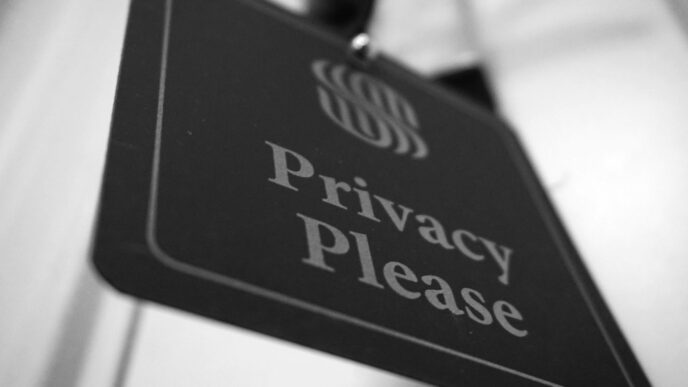So, the Justice Department is suing Uber. Apparently, they’re saying the company has been shortchanging people with disabilities. Think about it: many folks rely on these ride apps to get around, and the lawsuit claims Uber hasn’t been treating everyone fairly. It’s a big deal, and it’s all about whether Uber is following the rules when it comes to the Americans with Disabilities Act. We’ll look at what they’re accused of and what could happen next.
Key Takeaways
- The Justice Department has filed an uber ada lawsuit against Uber, alleging a pattern of discrimination against passengers with disabilities.
- The lawsuit claims Uber drivers have routinely denied rides to people with service animals and wheelchair users, and unfairly charged fees.
- Allegations include violations of the Americans with Disabilities Act (ADA), specifically Title III, which covers private transportation services.
- The DOJ is seeking substantial monetary damages for affected individuals, policy changes, and driver training to prevent future discrimination.
- This uber ada lawsuit highlights broader issues about technology’s role in accessibility and the need for government oversight to ensure equal access for people with disabilities.
Justice Department Files Uber ADA Lawsuit
The U.S. Department of Justice has officially filed a lawsuit against Uber, accusing the ride-sharing giant of widespread discrimination against passengers with disabilities. This legal action comes after numerous complaints and allegations that Uber drivers have routinely denied rides or provided substandard service to individuals based on their disabilities. The lawsuit seeks significant monetary damages and mandates substantial policy changes within Uber’s operations.
Allegations of Widespread Discrimination Against Passengers with Disabilities
The Department of Justice’s complaint outlines a pattern of alleged discriminatory practices that have impacted riders with various disabilities. These include:
- Routine ride denials for passengers with service animals: Many blind individuals, like Michael May mentioned in court documents, have reported being refused service when traveling with their guide dogs.
- Discrimination against wheelchair users: Passengers who use wheelchairs, such as Kingsly Joseph, claim drivers frequently deny them rides, leaving them stranded.
- Improper surcharges and policy refusals: The lawsuit alleges that Uber has unfairly charged cleaning fees for service animals and cancellation fees to riders who were unlawfully denied service. Furthermore, Uber has allegedly refused to make reasonable policy modifications, like allowing passengers with mobility issues to sit in the front seat when necessary.
Seeking Significant Monetary Damages and Policy Changes
This lawsuit isn’t just about making a statement; it’s about seeking tangible remedies. The Justice Department is pursuing substantial financial compensation for individuals who have suffered due to Uber’s alleged discriminatory actions. They are also demanding that Uber overhaul its policies and implement mandatory driver training programs to ensure compliance with the Americans with Disabilities Act (ADA). The goal is to prevent future discrimination and guarantee equal access to transportation for everyone. You can find more information about the ADA requirements for transportation services.
Uber Denies Discrimination Claims
In response to the lawsuit, Uber has publicly stated that it disagrees with the allegations. The company maintains its commitment to accessibility and improving the experience for riders with disabilities. Uber asserts it has a zero-tolerance policy for confirmed service denials and that riders with service animals deserve a safe and welcoming experience. However, the Justice Department’s complaint details specific instances and alleges a systemic issue that contradicts Uber’s claims.
Core Allegations in the Uber ADA Lawsuit
Allegations of Widespread Discrimination Against Passengers with Disabilities
The Justice Department’s complaint lays out a pretty serious picture of how Uber might be failing people with disabilities. It’s not just a few isolated incidents, but what they’re calling a pattern of behavior. Think about it: if you rely on a service like Uber to get around, and you’re repeatedly denied that service, it really messes up your day, right? The lawsuit points to several key areas where this alleged discrimination happens.
Routine Ride Denials for Passengers with Service Animals
One of the big issues raised is how drivers allegedly refuse rides to people who are traveling with service animals. This is a major problem because, under the Americans with Disabilities Act (ADA), people with disabilities have the right to bring their service animals with them. The lawsuit mentions specific instances where blind passengers with guide dogs were reportedly turned away. It’s like saying someone can’t use a taxi because their seeing-eye dog is with them – it just doesn’t make sense and is against the law. This kind of refusal can leave people stranded and unable to get where they need to go.
Discrimination Against Wheelchair Users
People who use wheelchairs or other mobility devices also seem to be facing significant hurdles. The allegations include drivers refusing to pick up passengers with stowable wheelchairs. This isn’t just about inconvenience; it’s about access to transportation. For many, ride-sharing services are a vital link to jobs, appointments, and social activities. When drivers refuse these rides, it directly impacts a person’s ability to participate fully in society. The U.S. Justice Department is suing Uber over these very issues.
Improper Surcharges and Policy Refusals
Beyond outright ride denials, the lawsuit also brings up other unfair practices. This includes charging cleaning fees for service animals, which is not allowed. It also covers situations where riders are charged cancellation fees after being unlawfully denied service. Furthermore, the complaint alleges that Uber has refused to make reasonable modifications to its policies when necessary. An example given is denying passengers with mobility issues the option to sit in the front seat, a simple accommodation that can make a big difference for comfort and safety.
Violations of the Americans with Disabilities Act

Title III’s Prohibition on Private Transportation Discrimination
The Americans with Disabilities Act (ADA) is a big deal when it comes to making sure everyone gets a fair shot, and Title III is specifically about private companies. This part of the law says that places people can go to, like transportation services, can’t discriminate against folks with disabilities. So, companies like Uber are supposed to offer the same kind of service to everyone, no matter if they have a disability or not. It’s not just about letting people ride; it’s about treating them equally.
Requirements for Service Animals and Mobility Devices
This is a pretty straightforward part of the ADA. For starters, drivers can’t refuse a ride just because someone has a service animal. Think guide dogs for blind individuals or other trained animals that help people. These animals are part of the person’s ability to get around, and the law says they have to be allowed. The same goes for mobility devices. If someone uses a wheelchair, even a foldable one that can fit in the car, drivers are expected to accommodate it. It’s about making sure these essential tools for independence aren’t a barrier to getting a ride.
Denial of Reasonable Accommodations, Such As Front Seat Access
Beyond just allowing service animals and wheelchairs, the ADA also talks about reasonable accommodations. This means making small changes to how things are usually done if it helps someone with a disability. For example, if a passenger has a mobility issue and needs to sit in the front seat for safety or comfort, a driver should ideally allow that. It’s not asking for a major overhaul, just a simple adjustment that makes a big difference for the rider. Denying these kinds of requests, like refusing a front seat when needed, can be seen as a violation because it’s a failure to provide equal access.
Impact on Riders with Disabilities

When Uber drivers refuse rides or fail to provide necessary accommodations, it’s not just an inconvenience; it can really mess up a person’s day, week, or even longer. For many people with disabilities, rideshare services are a lifeline, filling gaps where public transport falls short or isn’t accessible. The Justice Department’s lawsuit highlights how these alleged discriminatory practices can lead to significant disruptions and harm.
Here’s a look at some of the real-world consequences:
- Missed Appointments and Delays: Imagine needing to get to a doctor’s appointment, a job interview, or a critical meeting. A denied ride means scrambling for alternatives, often leading to significant delays. This can result in missed opportunities, lost wages, and added stress. For instance, one rider with a service dog was reportedly denied a ride to the airport, causing him to miss his flight and endure a 16-hour drive home.
- Being Stranded: In some cases, riders have found themselves stranded, unable to secure alternative transportation after an Uber driver cancels or refuses service. This can be particularly frightening and isolating, especially if it happens late at night or in an unfamiliar area.
- Emotional and Physical Toll: Beyond the practical issues, these experiences can take a heavy emotional toll. Repeated denials and mistreatment can lead to feelings of frustration, anger, and a sense of being devalued. For individuals with mobility impairments, the physical effort and stress of trying to find accessible transportation after a denial can also be considerable.
These aren’t just abstract legal points; they represent daily struggles for people who are simply trying to navigate their lives and participate fully in society. The reliance on technology for accessibility, while promising, shows its limitations when not paired with proper training and a commitment to civil rights, as seen in the ongoing Uber ADA lawsuit.
| Type of Impact | Examples |
|---|---|
| Logistical | Missed flights, late for work, inability to attend appointments, extended travel times. |
| Emotional | Frustration, anxiety, feeling unwelcome, reduced independence, stress from uncertainty. |
| Financial | Lost wages from missed work, costs of alternative transportation, potential cleaning or cancellation fees. |
| Physical | Fatigue from prolonged waiting, stress-related physical symptoms, difficulty managing mobility devices. |
It’s clear that the way rideshare services operate has a direct and profound effect on the daily lives of riders with disabilities.
Legal Ramifications and Sought Remedies
Court Order to Halt Discriminatory Practices
The Justice Department is asking the court to issue a clear order telling Uber to stop its alleged discriminatory practices right now. This isn’t just about a slap on the wrist; it’s about forcing a change in how Uber operates. They want Uber to actively prevent drivers from denying rides to people with service animals or those who use wheelchairs. Basically, they’re aiming for a court mandate that ensures Uber’s platform doesn’t facilitate or allow discrimination against passengers with disabilities anymore. It’s a pretty big deal, aiming to make sure that the technology meant to connect people actually works for everyone.
Mandatory Policy Modifications and Driver Training
Beyond just stopping the bad behavior, the lawsuit is pushing for concrete changes within Uber’s system. This includes updating Uber’s official policies to make sure they align with the Americans with Disabilities Act (ADA). Think about things like how ride cancellations are handled, or what happens when a passenger needs a bit of extra space or a different seating arrangement. On top of policy changes, there’s a big push for mandatory training for all Uber drivers. The idea is to educate drivers about the ADA, their responsibilities, and how to properly accommodate passengers with disabilities. This could involve:
- Understanding service animal rights.
- Properly assisting passengers with mobility devices.
- Knowing how to handle requests for front-seat access when needed.
- Avoiding improper fees for issues related to disabilities.
Civil Penalties to Vindicate Public Interest
This lawsuit isn’t just about compensating individuals who have been wronged; it’s also about sending a message. The Justice Department is seeking significant monetary penalties, sometimes referred to as civil penalties. These aren’t just fines; they’re meant to punish the company for violating federal law and to show that discrimination has real consequences. The amount sought can be substantial, potentially reaching into the millions, like the $125 million mentioned in some reports. This money serves a dual purpose: it helps to make up for the harm caused to people with disabilities and also acts as a deterrent, encouraging Uber and other tech companies to take accessibility seriously. It’s about upholding the public’s right to equal access and making sure that companies are held accountable when they fall short.
Broader Implications of the Uber ADA Lawsuit
This whole situation with Uber and the Justice Department really makes you think about how we rely on technology these days, especially for things like getting around. It’s easy to assume that apps and online services are automatically inclusive, but this lawsuit shows that’s just not the case. Technology can create new barriers just as easily as it can break down old ones.
Challenges of Relying on Technology for Disability Inclusion
When we talk about ride-sharing apps, they’re supposed to make life easier, right? For many people with disabilities, these services fill in the gaps where public transport falls short. But what happens when the app itself, or the drivers using it, create new problems? We’re seeing allegations of drivers refusing rides, charging extra fees unfairly, or not making simple accommodations like letting someone sit in the front seat. It’s not just about the app working; it’s about the human element and whether the system is set up to treat everyone fairly.
The Role of Government Regulation in Ensuring Equal Access
This lawsuit is a big deal because it shows the government stepping in. It highlights that just having a law like the ADA isn’t enough. We need active enforcement to make sure companies actually follow the rules. It’s like having speed limits – the law is there, but police are needed to make sure people slow down. Without government oversight and the willingness to take legal action, companies might not feel pressured enough to change their practices, especially if it costs them money or requires effort.
Need for Centering Disabled People in Tech Development
Ultimately, this case points to a bigger issue in the tech world. Companies are often so focused on building new features or expanding their market that they forget to ask: who might be left out? Designing technology with disabled users in mind from the start, rather than as an afterthought, is key. This means involving people with disabilities in the design process, listening to their feedback, and making sure their needs are a priority, not just a compliance checkbox. It’s about building a more accessible future for everyone, not just a select few.
What’s Next?
This whole situation with Uber and the Justice Department really highlights a bigger issue. While ride-sharing apps can be super helpful for people with disabilities, relying on them completely to bridge gaps in transportation isn’t always the answer. The lawsuit is a big deal, and hopefully, it pushes Uber to make real changes so everyone can get around without facing discrimination. But it also makes you think about how we can build better, more inclusive systems overall, not just depend on one company to fix everything. It’s a reminder that technology is a tool, but it’s people and policies that truly make a difference in accessibility.
Frequently Asked Questions
What is the main reason the Justice Department is suing Uber?
The Justice Department is suing Uber because they believe the company has been treating passengers with disabilities unfairly. They claim Uber drivers have often refused rides to people with service animals or wheelchairs, breaking the law.
What laws does Uber allegedly break?
Uber is accused of violating the Americans with Disabilities Act (ADA). This law makes sure that people with disabilities have the same access to services, like transportation, as everyone else.
What specific problems are mentioned in the lawsuit?
The lawsuit talks about drivers denying rides to people with service dogs, refusing to give rides to people in wheelchairs, charging extra fees for things like shedding from service animals, and not letting people with disabilities sit in the front seat when they need to.
What does the Justice Department want Uber to do?
They want Uber to stop these unfair practices, change their rules to follow the ADA, and train their drivers better. They are also asking for money to be paid to people who were treated unfairly and for Uber to pay a penalty.
Does Uber agree with these accusations?
No, Uber disagrees with the claims. They say they are committed to making their services accessible and welcoming for all riders, including those with disabilities, and have a policy against denying rides.
Why is this lawsuit important for people with disabilities?
This case highlights how important it is for technology companies to make sure their services are usable by everyone. It shows that laws like the ADA are crucial for ensuring people with disabilities have equal opportunities and can get around easily.














